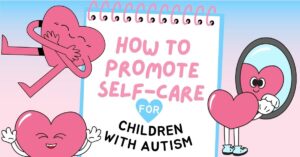Everyone’s definition of what it means to be healthy is a bit different, but self-care is certainly something that shouldn’t be ignored – especially for those with autism spectrum disorder.
The World Health Organization (WHO) defines self-care as “the ability of individuals, families, and communities to promote/maintain health, prevent disease, and cope with illness and disability with or without the support of a health worker.”
This means everything from keeping up with hygiene to maintaining a nutritious diet plays a part in how we care for ourselves.
Self-Care Differs for Children with Autism
It is important for children with autism to learn self-care skills so they can live more fulfilling and independent lives. Ariana R. Boutain, Jan B. Sheldon, and James A. Sherman from the Department of ABA at the University of Kansas explain the importance of self-care skills for children with autism in social settings.
“Deficits in self-care skills can hinder a child’s integration into daycare or school settings and result in a greater reliance on
parents to complete these necessary skills.”
Parents want to see their children achieve their goals and live self-sufficient lives. Learning self-care skills offers families a pathway toward this, but the later one waits, the harder it will be for those with autism to master these skills.
“Researchers have found that the speed of learning self-care skills in children with ASD slows down over time.”
It’s never too early to see if ABA therapy is right for your family. You can learn more about the importance of early intervention for children with autism here.
Examples of Self-Care Skills
Before diving into how a child with autism can learn self-care skills, it is important to identify some common focus areas.
-
Getting enough sleep
-
Maintaining a healthy diet
-
Exercising
-
Brushing teeth
-
Taking a bath/shower
These can certainly differ from child to child, and it’s important to remember that mastering many of these skills requires the expertise of an ABA therapist.
Children Could Learn Self-Care Skills Through ABA Therapy
Children with autism can master self-care skills through Applied Behavioral Analysis (ABA) therapy. ABA therapy is a form of autism treatment that is endorsed by the CDC and breaks down challenging life skills and goals into bite-sized pieces. Through practice and repetition, children with autism can begin to perform actions on their own and become more confident, independent,
and social on their personal journey with autism.
An ABA therapist will work on specific skills that are found in a child’s treatment plan. Therapists may use several kinds of techniques to help children with autism master targeted self-care skills.
-
Discrete Trial Training (DTT) – A teaching technique that breaks down an action into small, bite-sized pieces and uses positive reinforcement as a means of incentivizing the desired behaviors.
-
Natural Environment Teaching (NET) – This is when an ABA therapist has the child practice a skill in a real-life setting. For example, if a child is learning to keep a consistent exercise routine and enjoys running, a therapist may bring them to a dirt track.
-
Modeling – This is a teaching technique where students imitate a target behavior from someone who has already mastered the sought-after skill or behavior.
What ABA therapy techniques are used changes depending on what skill is being learned or what works best for the child with autism.
Learning Shouldn’t End with Therapy
Self-care isn’t something that should stop when therapy ends for the day. Instead, it is something that parents should practice and encourage at home. Even if they don’t get it on the first try, remain patient and praise them when they accomplish something they’ve been practicing.
When learning, it may be best to find ways to incorporate self-care in a way that they can expect. Have them shower at the same time in the morning or brush their hair every evening before bed. As they grow more comfortable, increase/decrease the frequency of the skill as needed. Eventually, many of these self-care skills will become a regular part of their day.
Want to see if Applied ABC is a right fit for your family? Fill out our getting started form today!
Sources Cited
Boutain, A., Sheldon, J., & Sherman, J. Evaluation of a Telehealth Parent Training Program in Teaching Self-Care Skills to Children With Autism.
Centers for Disease Control and Prevention. Treatment and Intervention Services for Autism Spectrum Disorder.
Chi, I. & Lin, L. Relationship Between the Performance of Self-Care and Visual Perception Among Young Children With Autism Spectrum Disorder and Typical Developing Children.
World Health Organization. Self-Care Interventions for Health.






